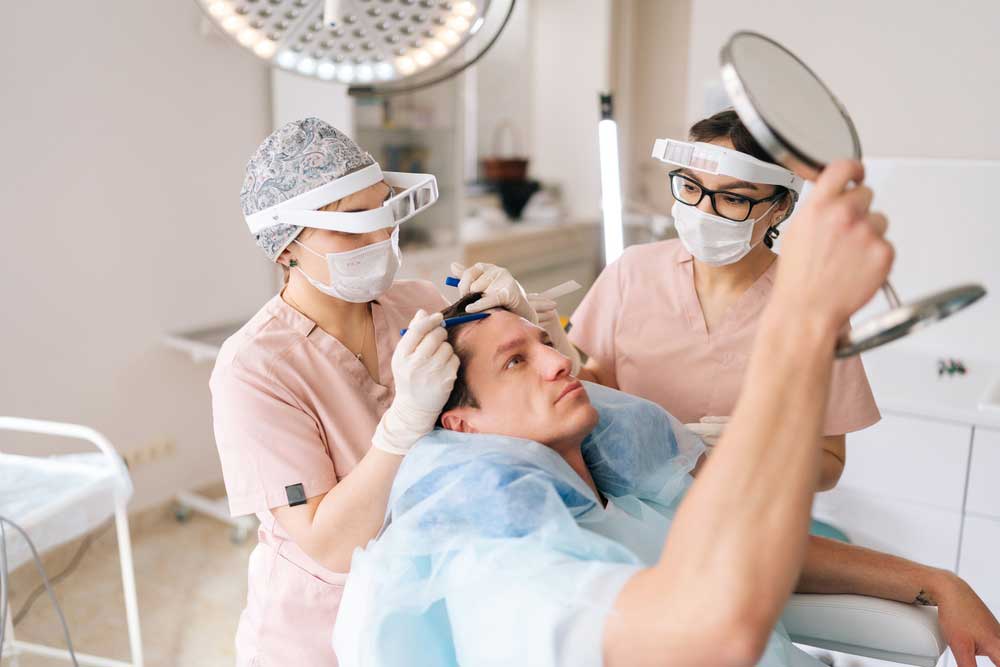Are you worried about the amount of hair you have been shedding off late? Wondering how much hair falling out is usual, or concerned that you may have hair loss? There is undoubtedly a difference between hair shedding and hair loss. It is essential to know how much hair shedding is normal to understand this difference. According to the American Academy of Dermatology, shedding between 50 and 100 strands of hair a day is normal. If you have noticed your hair fall is significantly above average, you may be suffering from excessive hair shedding or hair loss.
Difference between hair shedding and hair loss:
Hair Shedding
If you are shedding beyond the usual 50 and 100 hair strands each day, you are likely to be suffering from a condition called telogen effluvium, which is mostly stress-induced. Some of the most common stressors include:
- Recovering from a disease or illness – particularly if it involved high fever
- Having undergone an operation or a surgery
- Pregnancy and childbirth
- 20+ pounds loss in body weight
- Increased stress levels caused by circumstances like divorce, losing a job, losing a loved one, and so on.
Generally, it takes a few months for people to notice they are shedding excessive hair. However, as soon as your body readjusts, the shedding stops, and the hair begins to regain its usual volume. Nevertheless, if you continue to remain under stress, excessive hair shedding can be long-term.
Hair loss
While hair shedding is usually temporary, hair loss happens when the hair stops growing altogether. Various factors can impact hair loss, such as:
- Family history/hereditary hair loss
- Side effects of certain drugs and treatments
- Immune disorders
- Tight hairstyles
- Harsh hair-care products
- Trichotillomania, or the urge in people to pull out their hair
It is crucial to find out the cause of hair loss to treat it. Hair loss caused due to medical treatment like chemotherapy or radiation treatment usually stops once the treatment stops. However, if you suspect that a treatment or medicine is causing your hair loss, discuss it with your doctor. Do not immediately stop the treatment or drug because serious side effects can occur if you do so. Your doctor can diagnose the cause and recommend a suitable treatment option for you.
Doctors can differentiate between hair loss and hair shedding
If you feel you are suffering from excessive hair shedding or hair loss, talking to your doctor will help. A dermatologist can diagnose the cause of your hair loss and will also be able to tell you whether you have excessive hair shedding or hair loss.
After determining the cause, your dermatologist will counsel you on the various treatment options available.
Hair loss treatment options
There are various effective options available to treat and reduce hair loss. These include medical therapies and hair restoration surgery, among others.
Medication
Minoxidil (Rogaine) and Finasteride (Propecia) are two over-the-counter drugs approved by the FDA, widely used to treat hair loss in men and women. Minoxidil is a topical solution that should be applied on the scalp. It is effective in regrowing hair and slowing the rate of hair loss. Finasteride, too, can slow hair loss and lead to new hair growth.
Surgery
- Follicular Unit Extraction (FUE) – Individual hair follicles are extracted from the donor area (typically from the back of the head) by making minute incisions. The hair follicle units are then transplanted into the balding portion on the scalp. The incisions will heal soon, and provide minimal scarring.
- Follicular Unit Transplantation (FUT) – Unlike FUE, an entire strip of scalp is extracted from the donor area instead of individual hair follicles. The strip of skin is then further dissected into tiny follicular grafts, with each graft comprising either an individual hair strand or a few hairs. These grafts are then transplanted onto the recipient area.
If you are experiencing significant hair shedding or hair loss, contact our experts at the NJHRC (New Jersey Hair Restoration Center). Dr. Emil Shakov, the co-founder of the NJHRC, is a board-certified aesthetic surgeon and is one of the best hair transplant doctors in New Jersey. We offer the most advanced surgical techniques for hair restoration and hair loss treatment.


